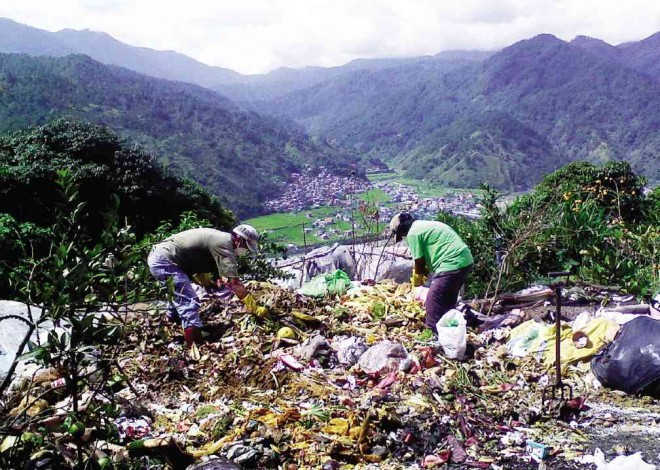Bontoc plan to remove trash from dump awaited

WORKERS segregate plastic rubbish from biodegradable wastes to be prepared for composting at the new Ecological Park 1 of Bontoc, the capital town of Mountain Province, which was slapped in 2012 with a writ of kalikasan for an open dump near a river it shares with Kalinga province.
BONTOC, Mountain Province— This province’s capital, Bontoc town, has developed ecological sanitation parks, crushed glass and plastics into construction materials, and enforced a plastics ban to fulfill the conditions of a 2012 writ of kalikasan over an open dump that used to operate a hundred meters from Chico River.
Bontoc was subjected to a temporary environmental protection order issued in October 2012 following an environmental complaint filed by a Kalinga nongovernment organization.
A major Cordillera river system, Chico River starts from Mount Data in Mountain Province and traverses the towns of Bauko, Sabangan and Bontoc, as well as Kalinga towns of Tinglayan and Pasil and capital, Tabuk City.
But Kalinga Antipollution Action Group, which sued Bontoc for polluting Chico River, said it was still awaiting plans for the removal of the mountains of garbage that make up the decommissioned dump in Calutit village.
Bontoc is developing three ecological parks, which would house a composting facility for biodegradable wastes, a processing facility, which would develop eco-bricks and eco-blocks as waste byproducts, and a residual waste processing facility.
Desiree Sokoken, Bontoc public information officer, said the town came up with a solid waste management plan after the Court of Appeals issued the order to close the Matoytoy-ok dump in Calutit in 2012.
At present, biodegradable wastes collected from the town’s four central villages go to Ecological Park 1 (Eco 1), which is a composting facility being managed jointly by the Bontoc government and Bontoc Market Vendors’ Association. Recyclable wastes go to junk shops while residual wastes go to a temporary containment area.
Bontoc also directed its business establishments to stop using plastic bags as packaging materials. “The plastics ban has been on for three weeks already and most of the local business establishments have been complying,” said Bontoc Mayor Frank Odsey.
Most of the town’s sanitation resources have been invested in the two eco-parks.
Roger Agcapen, municipal environment and natural resources officer, said the
500-square-meter Eco 1 composts biodegradable wastes, most of which come from the town’s public market.
“Biodegradable wastes are mostly vegetable and fruit peelings and most of these end up as animal feeds in many of the town’s villages,” he said.
Odsey said Eco 2, which would process bottles and plastics into eco-bricks or as construction filling materials, is being developed. It would also host a botanical garden to be planted with herbs and fruit trees. Kimberlie Quitasol, Inquirer Northern Luzon